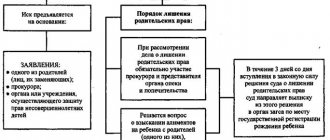The following two tabs change content below.
- Author
- Author's articles
Anastasia Klimenkova (Lawyer)
7 years of experience.
Author: Anastasia Klimenkova (Lawyer) (All articles by the author)
- What to do if a tree falls on your car: step-by-step instructions - 09.27.2021
- What will the pension be if there is no minimum work experience in 2021 - 09/02/2021
- What is the length of service required to retire in 2021? — 08/23/2021
When the recipient of alimony under a writ of execution is highly dependent on the receipt of funds, violations of the payment period cause great concern. If alimony does not come to the person for whom it is the only source of income, the well-being of the entire family is at risk. Let's consider what to do if there are no payments, and where to go in this case.
Reasons for non-payment of alimony
The most common reasons for non-compliance with the terms of calculating alimony are as follows:
- The payer refuses to fulfill financial obligations that were assumed by him independently or imposed by the court. For example, I paid myself, and then decided to save money.
- The payer was fired from his job. If the writ of execution was sent by a bailiff or payee, they will be returned a sheet indicating all payments. If the debtor himself gave the paper to the accounting department, the document will be returned to him, and the recipient of alimony may be in the dark for a long time.
- Salaries at the debtor's place of employment are delayed.
- There was a technical glitch when paying the alimony amount. For example, the transfer was made to a Sberbank card, but the debit must be made from a card of another bank. Technical errors are often corrected within five days.
Regardless of the reason for which alimony was not transferred, persons who did not send money are not exempt from liability.
Payer's fault
Often, alimony is not paid due to the fault of the payer, and not third parties. And before blaming the employer for delaying money, you should talk to the payer. This will help not only establish the reason for the lack of payment, but also determine the presence of guilt.
From a legal point of view, the employee’s guilt in case of delay in alimony may be as follows:
- He lost his job. It does not matter whether this was an independent dismissal or a reduction in staff.
- Refused further employment. At the same time, the payer does not want to register with the employment center to receive the appropriate benefit.
- Becoming disabled or reaching retirement age does not relieve a parent from the obligation to support a child. Only payments begin to be deducted from the pension.
The presence of other dependents, a loan or mortgage, etc. are also not valid reasons for absence. But there are factors that indicate the absence of the payer’s fault:
- The delay occurred due to force majeure circumstances (disaster, emergency, etc.).
- Difficult life circumstances: hospitalization, the need for an expensive operation.
- The omission was due to the fault of third parties. This can be not only an accountant of the organization, but also a bank employee.
Various technical failures during the transaction indicate the absence of fault not only of the employee, but also of the employer. A payer who has become aware of a delay in payments due to the fault of the employer may request appropriate justification from him. This document must be handed over to the bailiffs in order to avoid prosecution.
Appeal to the debtor
If the reason for non-payment is known for certain, the fastest way for the recipient to contact the payer directly.
If there was an oral agreement with the debtor, the following actions must be taken:
- from finding out the reasons for the termination of payments (the reasons may be valid, for example, loss of a job, serious illness, large losses of money);
- with negotiations on continued debt payments. It is better to document all agreements in writing and have them notarized;
- informing about the legal consequences of not fulfilling the parent’s duty (application to a judicial authority to compulsorily collect alimony payments with the accrual of penalties and fines).
If the payment of alimony was made according to an agreement concluded between the parties at a notary, you just need to remind that this agreement is an executive document and can be presented to the bailiff at any time.
If the debtor refuses to pay these amounts, he may be held administratively liable and subsequently deprived of parental rights.
If the payer hides from the recipient and does not answer calls, you can put him on the wanted list.
If search efforts do not produce results, the claimant may file an application with the court to declare the citizen missing (dead) in order to obtain a survivor’s pension.
Can child support be below the subsistence level for a child?
Unfortunately, in Russian legislation there is no concept of minimum alimony. The question of introducing it and linking it to the children's subsistence minimum (MS) has been raised quite often in recent years. The last time such a proposal was made was in the summer of 2020, but again to no avail. Perhaps the authorities will return to this issue in 2021.
While minimum alimony is not stipulated by law, it can be calculated approximately. There are two ways: as a percentage of the payer’s income or in TDS. What is the difference and how is the calculation method chosen?
Alimony as a share (percentage) of income is collected if the second parent has an official stable income. If the payer works full time, then he cannot receive less than the minimum wage (minimum wage). The latter is equal to 12,792 rubles. in 2021 . Next, income tax of 13% is deducted from earnings, and then alimony payments are calculated as a percentage of income.
That is, alimony from a small salary will indeed be lower than the minimum monthly wage per child. Theoretically, the smallest alimony in 2021 will be 2,782 rubles. , as can be seen from the table below. In practice, they may be even less if the payer earns less than the minimum wage (for example, works part-time).
Minimum alimony payments in 2021 as a percentage of earnings
| For how many children is child support paid? | Minimum amount of alimony, rub., according to the minimum wage (12,792 rub.) in 2021 |
| One (25%) | 2782,26 |
| Two (33.3%) | 3705,97 |
| Three or more (50%) | 5564,52 |
Alimony in TDS (a fixed sum of money) is precisely tied to the monthly minimum allowance for the child in the region of residence. Most often, the amount of payments is set equal to half of such a monthly minimum . This is done with the theoretical calculation that both parents should invest equally in the maintenance of the child.
Example : In 2021, when assigning alimony, the TDS takes into account the children's monthly income for the 2nd quarter of 2021. Let's say, in the Krasnodar Territory it is 11,114 rubles. This means that child support in TDS for one child will be 11114 x 0.5 = 5557 rubles.
In both cases, it is clear that alimony can be not only below the child’s monthly minimum, but also below half of it . However, you can try to increase payments if there are serious reasons for this.
Contacting the debtor's employer
If the writ of execution is in the employer’s accounting department, but the money is not transferred for unknown reasons, you must contact the accounting department at the debtor’s place of employment for clarification.
It is best to prepare a request in writing addressed to the director of the organization.
It is necessary to indicate all the circumstances of the case and ask for clarification on the situation that has arisen.
At the end of the document, it must be indicated that if payments are refused or a response is not provided within the specified time frame, the applicant must go to court to force the collection of funds.
You can personally visit the debtor’s organization to quickly obtain the necessary information.
If the payer is fired for any reason, payments stop automatically as no wages are accrued.
If the transfers were not made due to the fault of the accounting staff, most often within a few days after the errors were discovered, the money is transferred to the correct account.
If money is delayed without reason due to the fault of the organization, the claimant can file a lawsuit to force the collection of alimony payments.
In addition, you can write a statement to the prosecutor's office with a request to look into this situation and bring the perpetrators to justice.
How to calculate alimony penalties: amount and penalties for late payments
When filing a claim for the recovery of alimony penalties, the applicant is responsible for calculating its amount. As stated earlier, the penalty is 0.5% of the debt amount for each day of delay. As for the calculation procedure, it directly depends on how alimony payments were assigned:
- In hard cash terms. In such a situation, the alimony debt increases every month in an amount that is a multiple of that stated in the writ of execution.
- As a share of wages. In this option, the debt gradually accumulates if the alimony payer remains without work and other sources of income from which payments can be withheld.
Appeal to bailiffs
The most convenient way to resolve issues regarding the calculation of alimony is through the bailiff department. This option is often used in the following cases:
- The debtor refuses to pay alimony voluntarily.
- The payer has lost his job or is not officially employed, so there is no place to make deductions.
When determining the reason for the formation of the debt, the applicant must submit a written application to the bailiff department to initiate proceedings under a writ of execution.
Subsequent work with the citizen is carried out by a bailiff in accordance with the provisions of Federal Law No. 229. The activities of a FSSP employee include the following actions:
- calling the alimony officer to clarify all the circumstances, conducting an explanatory conversation;
- collecting the necessary information about the financial condition of the debtor: establishing his sources of income; presence of property, bank accounts, debts to other persons;
- forced collection of the amount of debt, enforcement fees and penalties for late payment of alimony amounts;
- seizing bank accounts and existing property;
- bringing the debtor to administrative liability in the form of a fine, arrest, compulsory or forced labor, restriction of freedom;
- restriction of the ability to drive vehicles;
- restriction of the possibility of traveling abroad.
If the bailiff does not carry out these actions, the applicant has the right to file a complaint with a higher-ranking official of the FSSP department.
If there is no answer, you can contact the prosecutor's office or court.
Going to court
Collection of penalties is carried out only if there is a court decision, an order from a magistrate, or an agreement on the payment of alimony.
To achieve a positive decision, the recipient of alimony must do the following:
- Collect a list of necessary documents (court decision, order to withhold alimony from the debtor’s place of work, bank statements and other payment documents, a certificate from the FSSP department on the calculation of the debt and penalties for non-payment of alimony).
- Prepare a statement of claim to recover the amount of the penalty.
- Appear at the court hearing.
- Submit the writ of execution issued on the basis of the decision that has entered into force to the bailiff.
After completing all these steps, the applicant needs to check the receipt of funds.
If they do not arrive, you need to contact the bailiff department for clarification.
If the claimant does not receive alimony, it is necessary to find out the reason for the lack of cash receipts and try to resolve the issue of resuming payments with the debtor on a voluntary basis.
If this is not possible, the applicant should contact the bailiff handling the case.
To collect penalties for a debt, you need to contact a judicial authority to issue a decision to collect the accrued fines.
Your rating of the article
Responsibility for late transfer of alimony amounts
For delay in transferring established payments, material, administrative and criminal liability is provided. Art. 115 of the RF IC for untimely fulfillment of obligations to pay child support, the following sanctions are provided:
- A penalty in the amount of 0.1% is reimbursed for each day of delay;
- Damages incurred as a result of non-compliance with translation deadlines are compensated.
The implementation of such measures is possible only on the basis of a court decision after filing a claim. But such measures can only be applied to the debtor as an individual when his guilt is established.
In accordance with Article 109 of the RF IC and 98 of the Federal Law “On Enforcement Proceedings,” the employer has only three days to accrue and transfer money for the debtor’s alimony obligations. If such deadlines are violated, then Article 17.4 of the Code of Administrative Offenses for failure to comply with the terms of the writ of execution or the legal requirements of the bailiff provides for the imposition of administrative sanctions on the guilty employee in the amount of 15 to 20 thousand rubles. At the same time, fines in the amount of 50 to 100 thousand rubles may be imposed on the organization.











